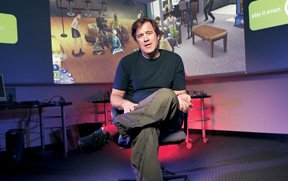Bing Gordon touts social game strengths
DICE 2011: AIAS Lifetime Achievement winner says that it isn't technology that drives greatness in games; rather, it's the bringing together of people.
Who was there: Fresh off receiving his Lifetime Achievement Award from the Academy of Interactive Arts and Sciences last night, Bing Gordon, currently a partner at venture capitalist firm Kleiner Perkins Caulfield & Byers, returned to the DICE 2011 spotlight in a Friday morning session titled "From Moore's Law to Mother in Law--One Gamer's Life."

What he talked about: Before joining EA in 1982, Gordon said that he worked at Intel, where he became influenced by the idea of Moore's Law. Posited by a leading Intel scientist at the time, Moore's Law dictates that processing power will double every 18 months.
Moore's Law was initially very important for Gordon, especially when he got to EA. This was the case, he said, because he was able to see that the sophistication of the games industry would roughly follow Moore's Law, leading to the game that were on show at last night's ceremony. And true to this principle, game consoles have largely followed Moore's Law in polygons per second and RAM since 1982.
However, when Nintendo found success with the Wii and DS beginning in 2004, he said he was surprised. After all, the success wasn't tied to Moore's Law, and this caused him to reflect on his most memorable gaming moments. He thought of Floyd from Planetfall and Lara Croft from Tomb Raider, and from these thoughts, he began to get a sense that Moore's Law isn't actually important.
He said that in 2004, he began measuring games in terms of hours played, and not money made. At the top of this list was Pogo with 225 million hours, followed by Madden NFL 05 with 180 million, EverQuest with 170 million, and Google search at 170 million.
Gordon also said that he started paying more attention to human behavior, calling out the marketing principle that just by changing a label on a bottle, behavior can be altered by 25 percent. He also had in his mind Malcom Gladwell's Blink, which discussed the idea that people make lasting decisions off the first five seconds of initial impressions.
From there, he began looking back at the "screenshots of his life," and he realized that meaning for him came from seeing these stills in the context of the people around him. From there, he recounted experiences with his wife playing Sneakers and his daughter playing the Sims or being the inspiration for the box art model of SSX (she was 13 at the time).
Other memories included creating the Madden franchise with Rich Hilleman. He said that the sales team and retailers didn't want another Madden for another five or six years, thinking it would oversaturate the market. However, he and Hilleman, whom he called a sports fanatic, both said to one another, "I'd buy it," going off the constant roster changes in sports culture and thus birthing the annualized sports simulation.
He also recounted an experience with a World of Warcraft player named Pint, whom he characterized as "the perfect party member." At one point, Gordon said that he met a man who introduced himself as Jason, and he was initially cordial at best to him. However, when Jason then said that he actually was Pint, Gordon said he exploded with enthusiasm, realizing at that moment that the stickiest game mechanic was people.
And this, he said, was the ultimate point he wanted to convey. When looking back at the screenshots of his life, it is the people that made the memories, not any particular game mechanic. Maximizing people's connection with one another, he said, is what game designers should be aiming for.
Quote: "Legendary relationships can be created because the stickiest game mechanic is people."--Bing Gordon, on the importance of social connections in games.
Takeaway: The takeaway from Gordon's session was quite clear: Games are better when social connections can be made. Going forward, the industry needs to separate itself from this idea that bigger and better technology will lead to better experiences. Instead, those better experiences will be the ones that can be experienced with others.
Got a news tip or want to contact us directly? Email news@gamespot.com
Join the conversation